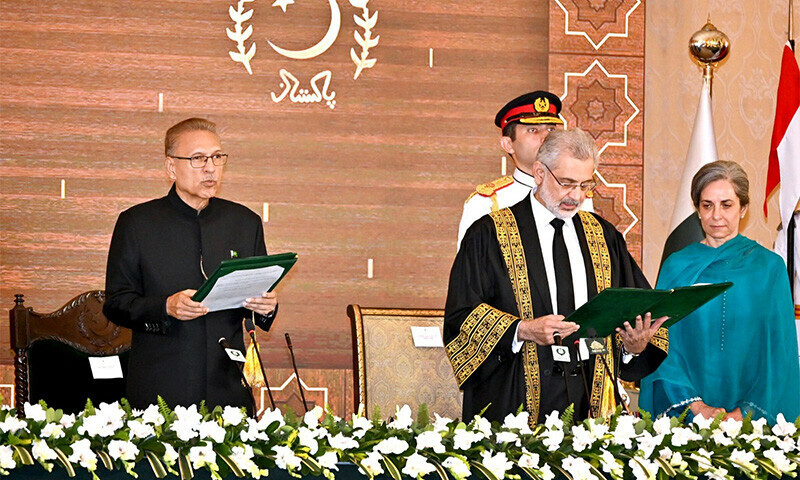Justice Qazi Faez Isa has been sworn in as the 29th Chief Justice of Pakistan after administering the oath in a grace-full oath-taking ceremony held at the Presidency on Sunday. An era in Pakistan’s judicial history completed its terms and a new dawn arises with the departure and arrival of top judges year on year basis. The nation in general and over 4 million case petitioners, in particular, re-energize their hopes for justice compensation. The public started dreaming about a revolution in the Country’s judicial system, through the elimination of bribes, reduction in corruption as well and speedy dispensation of justice to common citizens who often have a dreadful concept of Police investigation and court trials which consume lives but never come to a conclusion on merit.
The shuffle of the top adjudicators has become an important event in Pakistan’s government and political system because top judges not only decide the fate of the rulers but also set out future trends in domestic politics in today’s Pakistan. By in large, every new Chief already picks his long shopping list for tenure which comprises matters relating to the functioning of his department, his professional career plan, the welfare of family and friends, settlement of scores with the foes, along with any other fascinating agenda relating to his political, ethnic, sectarian and religious belief.
In the current scenario, the biggest challenge Justice Isa will be facing as the Chief Judge is unifying a highly polarized Supreme Court and restoring its credibility not among the judges but among the masses. During former Chief Justice Bandial’s tenure, the apex court was deeply divided and the perceived practice of the formation of a particular bench consisting of ‘like-minded judges’ to hear constitutional matters of public importance has invited criticism of the top judiciary. The excessive and political use of suo motu power together with live coverage of judges’ commentary during the hearing remained a concern for the public that seriously politicized the judiciary and damaged the image of the adjudicators. Meanwhile, the Supreme Court (Practice and Procedure) Act, 2023, the case of civilian trials in the military courts and Amendments the to Official Secret Act and Pakistan Army Act are the grave challenges that would test the professionalism and nationalism of the new Chief Justice. Interestingly, both the previous and the current top judge had the impression of having a soft corner toward the particular civic groups, that might be fixed or deepen those suspicions in the coming weeks, months or a year.
Realistically, Pakistan’s judicial system fails to delivery of timely justice to the public. The masses are utterly annoyed with the courts and compelled to settle their cases out of the courtroom after years of wait and a bulk of expenses and anxiety. Unfortunately, Police and Court unashamedly claim credit for such cases that are joke with the system as well as the public. Our judicial system struck fundamental biases of corruption and non-deliverance of justice during early years of the country’s independence after the feudal system took root in the politics. Feudal Politicians, landlords and other influential started using Police, courts and local administration for illegal and political purposes. Later, Pakistan’s top judiciary assumed the role of a power broker in the country’s politics during the 90s when the political government weighed war against the top Court and tried to use judges against political opponents in the garb of accountability and crusade against Corruption. The lawyers’ movement and restoration of Chief Justice Iftikhar Muhammad Chaudhry projected the impression of an invincible judiciary. Meanwhile, warring political groups tried to use the court’s crutches in pursuance of their political objectives that not only increased publicity of the top adjudicators but prompted disunity and tussle between the judges at the all levels.
Over the years, each judge introduce a new legacy, some earned names in sou motu notices, others inaugurated dams and hospitals, a few were cricket fans and others were fond of chess and wrestling. The new Chief Adjudicator has arranged a televised online Kechery so the public enjoy the debate of counsels with jury, recognise faces and remember their verdicts. Awfully, the public is dejected and has no interest in this circus. The top judge should not waste time on cosmetic surgery by increasing focus on real-time justice delivery. After all, judges’ decisions must speak louder than their commentary in the courtroom.







